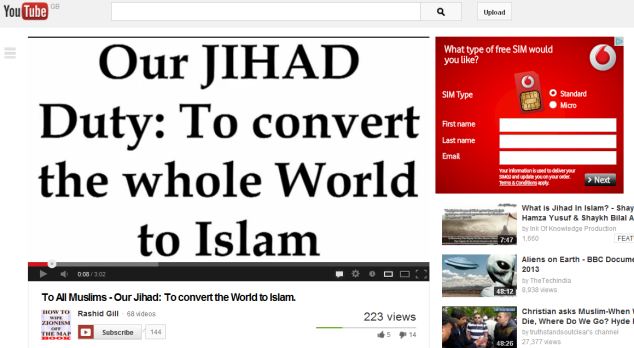Big brands have been inadvertently funding hate-preachers and terrorism
Google has been in hot water with reputable brands and well-established companies after it was found that their clients’ ads were being played on hate preachers’ videos.
L’Oréal was one of the many brands to be advertised alongside these extremist videos.
The French cosmetics company’s campaign for the Prince’s Trust- a charity set up to empower young people to get into jobs, education, and training- was ironically found playing alongside Steven Anderson’s hate-filled sermon.
Anderson had previously made comments about a terrorist attack on a gay nightclub in Orlando by saying: “The good news is that there’s 50 less pedophiles in the world.”
The Times reported that other brands including Nissan, Mercedes-Benz, Honda, HSBC and Disney were all running adverts on hate-filled YouTube videos.
An example as seen above, the new Mercedes E-Class saloon running next to a pro-ISIS video that has been viewed more than 115,000 times.
Adverts for John Lewis, Dropbox and Disney are embedded in sunnah-online.com. The website hosts lectures by Abu Ameenah Bilal Philips, a preacher banned from Britain who has argued that a husband cannot be charged with rape, and Esa al-Hindi, a terrorist sentenced to life imprisonment.

Source – Vodafone’s ad on an extremists video

Source— Denzel Washington’s ad on a video featuring Anwar Al-Awlaki, the former ideological leader of Al Qaeda
Unintentionally Funding Terrorism
If appearing alongside hate preachers’ videos wasn’t bad enough, both Google and extremists have been making money out of the adverts appearing alongside the offensive content.
The majority of these radicals earn extra income from ads that play on their videos— some of which gather more than a million views. Typically, every 1,000 views earn them up to $7.60, with Google also taking a cut.
This means that the advertisers were unintentionally providing income to hate-preachers. The Times reported that the practice “is likely to generate tens of thousands of dollars a month for extremists”.
But it’s not just terrorism. The British News also found some of these adverts sitting with online pornography.
Severe Backlash
The first investigation conducted by The Times discovered that large firms were inadvertently funding terrorism and even pornography.
James Dean, US Business editor of The Times, posted a screenshot of a pro-ISIS video with an ad on his twitter.
The Times’ second investigation on 17 March revealed that some of the largest companies- including publicly-funded organisations such as the BBC- unanimously announcing that they were withdrawing all advertising contracts made with Google and YouTube.
British retailer Marks & Spencer had announced previously that it would cease all advertisements with the internet company, several other companies such a L’Oréal, McDonald’s, the BBC and Channel 4 have also vouched to do the same.
More recently, major U.S firms AT&T, Verizon and Johnson & Johnson are also pulling out from their marketing deal with Google.
USA Today reported that AT&T confirmed in an email statement that the company is deeply concerned that their content has been “appearing alongside YouTube content promoting terrorism and hate.”
Google has since been questioned on how the internet company plans to prevent this from occurring again.
Apology NOT Accepted
The internet company has come up and apologised but failed to provide any in-depth details on how or if the company was going to take action to prevent advertisements from appearing on hate videos.
Google continues to face major ad boycotts by companies including the U.K. government, O2, McDonald’s, the BBC, L’Oréal, HSBC, Royal Bank of Scotland, Lloyds, the Guardian, Audi and Channel 4.
Source – the Guardian’s ad appearing on a pro-ISIS video
Yvette Cooper, British Labour MP and home affairs select committee chair accused Google of “profiting from hatred”.
“I want to start by saying sorry to the brands affected by this. I take the issue very seriously and I apologise in the instances where that may have happened.” Matt Brittin, Google’s head of Europe, the Middle East, and Africa, on issuing an apology statement.
“This apology from Google doesn’t go far enough,” Cooper said in response to Brittin’s apology statement. She added that Google is failing to do enough to remove illegal or hate-filled content from YouTube.
“It isn’t enough for Google to respond only when their advertising revenues take a hit. They are one of the biggest and most powerful companies on the planet. They can afford to do far more, far faster to deal with illegal and hate-filled content online.”
Paul Frampton, chief executive and country manager at Havas UK announced the company will be stopping all advertisements on Google networks.
He confirmed saying “our position will remain until we are confident in the YouTube platform and Google Display Network’s ability to deliver the standards we and our clients expect.”
Hava’s is the world’s sixth largest marketing services group with clients such as Dominos, Emirates and the BBC.
For now, like Hava, many of these companies remain firm on their withdrawal from advertising with Google until it can guarantee safety for their client’s brands.

















